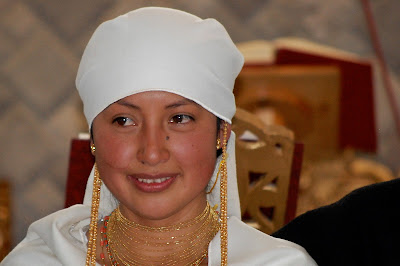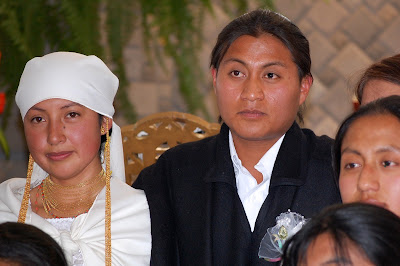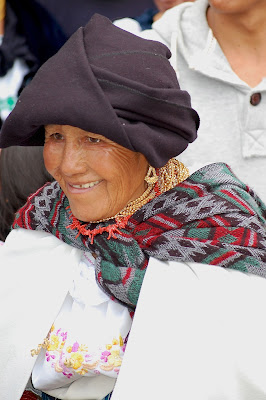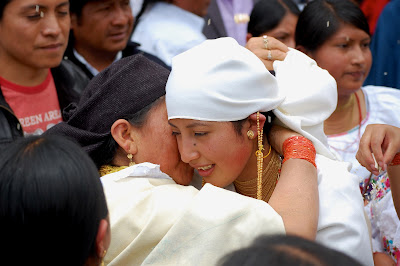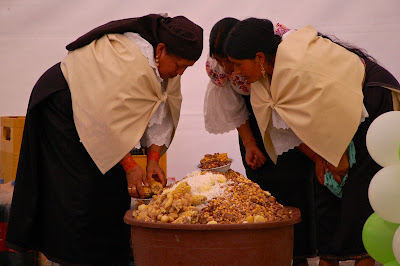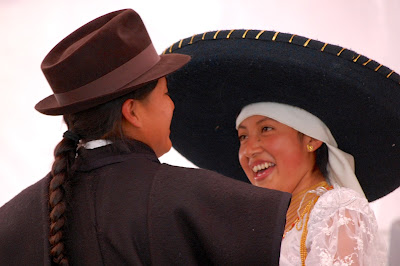"So, you mean I don't have to come back here with the factura?"
"No, it's in the system as soon as you pay the multa," says the very nice, patient woman at the desk in the Ventanilla Unica Empresarial (VUE), which translates literally and somewhat mysteriously to "Window Only Business" or maybe "Stop Shop for Business." Anyhow, she sports the typical pinstriped vest-suit most public service workers wear, including teachers.
But something was fishy here. Something here did not compute. Seven months in the land of paper trails, where everything requires a receipt and a minimum of three transactions at three different windows, and I'm thinking this trail goes further.
The whole thing started a couple of weeks ago. Our landlord-friend William had told me to be sure to cancel my SRI (Servicios Internas Rentas, or IRS) number, the number I'd obtained in order to get to be paid by the university -- after I'd already worked there for several months. The process of getting it was relatively painless, only requiring two trips and two waits to receive my RUC number, a sort of SS number so that I could pay 8% of my wages in taxes. Of course, since I was voluntarily paying into the system, that would be easy.
So William says casually: "Don't forget to cancel your number. You don't want to come back to Ecuador, maybe ten years from now and get stopped at the border where they'll tell you you owe $1,000s of dollars in back taxes." It happened to William, who's Ecuadorian -- after closing a bar (and his SRI account) years ago, he went to open another business, only to find he owed $8,000-plus in back taxes. Fortunately his wife had meticulously filed the factura away, and when he presented it to them, the SRI basically said, "Oh, my bad. Carry on."
OK, so I get it. Cancel the number. How hard could that be?
The first step is to go to the municipal offices in Otavalo, wherein there's an SRI office. As in any office, you first have to find the info desk and wait in line for a number. After waiting for two people to cut in front of me (the incredulous look apparently wasn't working), I assert myself before the third guy by giving him an elbow to the chest, and obtain my number. Then it's time to wait. The fact that there are only three rows of chairs bodes well -- the wait has yet to be bad in Otavalo, I'll give it that -- it's nothing like waiting in Quito where it's prudent to have at least two books and a meal on hand once you receive your number.
When my number dings on the overhead display, I pop up and head down the line of desks separated by plexi-glass. Two of the five slots are occupied by professional-looking women. I sit down at the second, and explain that I want to cancel my SRI account.
The first thing that I understand for sure is that "we need a color copy of your passport to start the process." OK, so after a couple of clarifying questions -- the kind of questions I've made a habit of asking here -- I leave the office, unlock the bike, and scan the downtown area. There are no fewer than eight copy shops visible from the patio above the central park, obvious for their vertical red "copias" signs. I head to the first one, with a sign that says "b/n y color" (blanco/negro and color), head one block over, lock the bike up, and go in. Here again, two people jump in front of me when I was clearly here first in this amorphous "line." What's up with that? When it's finally my turn, I'm told that they don't do color copies here. Argh.
Still, not that big of a deal, I go unlock the bike and head to another copy store, another block away, fish my lock out of my bag, lock the bike, and head in.
"I need a color copy of my visa and passport," I tell the girl at the desk, handing her my documents. She makes the copies, and I fishing in my pocket, I realize that all I have is a ten. Oh no! There is never any change in Ecuador, and I still don't understand this. Finding correct change is pretty much the unofficial national pastime. Can't you just get some rolls of quarters and dollars? That's probably too straightforward. Instead, there is a constant change game. You can see vendors in all kinds of stores hustling around the other stores trying to break a ten to make a sale. People hoard their dollar coins here like it's a baguette during the French Revolution.
"Ok, fine," I say, "I'll be right back." Head out, unlock bike, store the lock, and go to the phone store a block away, where I figure I can put 9 bucks of credit on my phone. Called "recharging" here, and like change, it's a constant game to balance juuust enough saldos (credit) to keep your phone going. If you run out of saldos during a phone conversation, your phone just cuts out. Kerry's gotten used to that. Of course, how hard would it be just to put 50 bucks on the phone and not worry about it for two months? Anyhow, I think I'll add $9 to my phone, get a buck in change, head back to the copy store, get my copies, and then go back to the SRI office. No sweat!
"I'm sorry, sir, I can't do $9" For real?! To be sure, I have not really been put out too badly, but this is getting comical. Apparently, I can get $8 in credit, which is fine, give me 8. I pay, check to make sure the saldos have actually been put on my phone, and head back to the copy store.
Despite this Herculean effort, I did not in fact successfully cancel my SRI/RUC number on Friday. I did, however, go back into the gov't office with my color copies of passport and visa, wait in line, get my number, wait, talk to a different lady, hand over my copies, and then, after filling out a form -- which took three tries because I kept messing it up -- I got a carbon-copy SECRET PASSWORD!
I was not really sure what to do with this, but I thought I understood that I was to pay $31.50 at any bank I chose (I'm sure of this part, because I asked the clarifying questions) to get out of the system, and I thought I understood that I was to hand the bank my carbon copy SECRET PASSWORD.
After 3 banks, I gave up, went home, had a beer, and forgot about it for the weekend. In retrospect, I'm not sure what I was thinking -- like I'd be able to slide my SECRET PASSWORD under the glass with a wink, pay the fee, and all would be forgiven. As it was the carbon copy SECRET PASSWORD travelled all over Otavalo by bike in my "wallet" (duct tape card holder with rubber band), and it was now beat up and sitting on the dresser, where it would stay for the weekend.
By Tuesday, I'd try again, and I'd understand the missing step with a familiar shunsho feeling (a Kichwa word for stupid). I'd gone in, waited for the number, gone to the correct office, restated the issue, and the very nice, patient lady -- this time with gestures -- directed me across the hall to the Ventanilla Unica Empresarial (VUE), which translates literally and somewhat mysteriously to "Window Only Business" or maybe "Stop Shop for Business."
But I could not just stroll casually across the hall. First, I would need to go get another number...
And here, at last, I was to present my carbon copy SECRET PASSWORD (which required yet another submission of color copies of my visa and passport to obtain) in order to make a DECLARATION. (What I was declaring was yet a mystery.)
Unfortunately, due to it's travels and long life outside of the world of the SRI, she could not make out one of the digits on the carbon copy SECRET PASSWORD. Fortunately, this lady was nice and patient, and after many tries, reissued my password, and put my declaration in the computer.
Now I was free to go to the bank of my choice to pay the multa! And I now know that the multa of $31.50 was levied because I did not declare anything on my RUC for the month of March, mostly because there was nothing to declare. This brings us back to the beginning, where I was told that was it, I'd be cancelled, and I did not have to come back with the factura. ("So, you mean I don't have to come back here with the factura?" Which was fishy, if you recall.)
After more consultations with William however, and the amazing insights of my beautiful wife, we realized the problem: I'd been using the word cancelar, which does indeed mean cancel in Spanish, but more commonly here it means "to pay," as in "to cancel your check" or "cancel your debt."
Ah-ha!
I did go to the bank and pay, and I did have the sense to save my factura. So now, with factura in hand -- proof I'd paid the multa -- I went back to the SRI office with total confidence. I got my number, waited, and went up to the woman in the vest-suit at the row of desks separated by plexi-glass. There, just to be sure, I used the words "close," "exit," "leave," "extinguish," and "stop." Apparently she caught my drift, and after signing a few forms, which of course had to be stamped a couple of times, I received the official notice that I was free of the system.
As ever, communication is context. Vivimos, for example, means both "we live" and "we lived," depending on how it's used. Bomba is bomb or gas station. Mandarina is either a small orange or a henpecked husband. Of course the meanings are completely different. Add to this a second language and the complications multiply.
"You have to think in Spanish -- you can't translate," says Juan, our Spanish teacher. Easier said than done, but I get the point: a lot of things just don't translate, especially word-for-word. Robert Frost famously said that "poetry is what's lost in translation," and if that's true, then I have to chalk this whole experience up as poetic.










































































